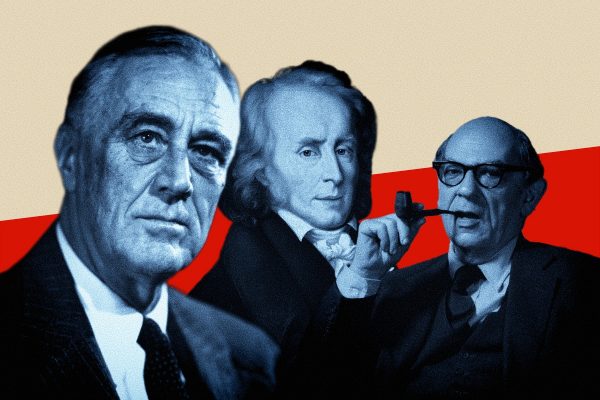When Theresa May succeeded David Cameron as prime minister and leader of the Conservative Party, she faced a set of decisions about how to manage the competing Tory factions: whom to keep from Cameron’s team, whom to bring in from outside, and whom to cut loose. Some of her choices were surprising, such as her eccentric decision to promote Boris Johnson, an idle logorrheic buffoon and former mayor of London, to the post of Foreign Secretary. But perhaps her least surprising decision was the dismissal of George Osborne, who had served for six years as Cameron’s chancellor of the exchequer. May and Osborne were known to hold each other in considerable contempt, with a leaked account of the meeting in which she dismissed him from the government involving May telling Osborne he should “learn some emotional intelligence,” a particularly damning assessment from a politician whose own lack of human warmth or empathy, coupled with her unfailingly robotic media performances during the election campaign, were to earn her the nickname of “the Maybot.”
Osborne’s six years in charge of the United Kingdom’s Treasury, a powerful government department that combines roles in macroeconomic management and government budgeting, had seen a dreary program of austerity for the country’s poorest citizens, combined with tax cuts for the wealthiest. During the Osborne years of systematic under-investment, the sclerotic economy limped along only by virtue of the good offices of the Bank of England, which pumped hundreds of billions of pounds of new money into the economy through its program of quantitative easing. That one of the key themes of the Tories’ 2017 election campaign was to turn on the slogan that “There is No Magic Money Tree,” intended as a rebuke to Labour’s carefully-costed tax-and-spend plans, carried with it a special irony when their own miserable economic record had avoided disaster only because of the existence of the Magic Money Tree of Threadneedle Street.
But while the economy at least managed to limp along thanks to the effects of quantitative easing, Osborne’s dismal austerian stewardship of the British economy was slowly building up a general sense of betrayed hopes. The country’s appetite for new and more radical economic solutions took root, as the intellectual bankruptcy and harsh treatment of British economic management under Osborne increasingly showed the painful uselessness of neoliberal austerity. And so Osborne’s greatest gift to the Labour Party was the clear demonstration that, given how grim economic barbarism could be, the British people could have good reason to choose socialism instead.
British political careers have become one-act plays. But the long-term prospects of George Osborne and Ed Miliband remain fascinating, while Theresa May’s trajectory has shot into free-fall.
Whatever role Osborne has played in creating the preconditions for the Labour surge, there are also more short-range tactical reasons why May could end up regretting her harsh treatment of Osborne, for what is left of her political career. Rather than skulking off to the back-benches of parliament, Osborne set himself up with a bewildering portfolio of external jobs, gladly provided by his good friends among the world’s hedge-fund managers and oligarchs. His friend Evgeny Lebedev, son of the Russian oligarch Alexander Lebedev, owner of the London Evening Standard newspaper, which is given away for free daily to London’s commuters, made Osborne an offer he couldn’t refuse when he made him that newspaper’s editor. Despite having no background in journalism, and being a sitting member of parliament at the start of his tenure as editor, Osborne has taken to his new role with considerable aplomb, giving the clear impression that this may all be part of the realization of his long-term political ambitions.
From the editor’s chair at the Evening Standard, Osborne has installed himself as a powerful neoliberal critic of May’s less cosmopolitan and more “Little Englander” form of Toryism. In doing so, he has done three things. For one he has clearly had a great deal of fun, belying the old adage that revenge is a dish best served cold to suggest that revenge can be just as good when served alongside the fury of a scorned man. Secondly George Osborne has unexpectedly served the Labour Party well in all this, and with all the signs being that he will continue to do so until he has brought May down. On the day of writing Osborne had been on the BBC’s flagship Sunday morning Andrew Marr Show, the U.K.’s leading weekly political interview show, to describe May as a “Dead Woman Walking,” thereby helping to keep the political wind against his old enemy and filling Labour’s sails at the same time. But thirdly a wily strategist like Osborne, architect of the Tories’ unexpected 2015 election win, also seems to have wider plans afoot. The indications are that Osborne, with his almost Blairite mix of social liberalism and economic neoliberalism, has some hope that he may come to occupy the mythical role that we might usefully describe as Le Macron Brittanique.
If this is Osborne’s plan, it won’t work for him. There are two reasons it won’t work, one relatively shallow and the other more structural.
Firstly Osborne’s public persona is of a rather hateful and self-satisfied figure, without a discernable iota of human charm. I am informed by friends who have dealt with him as journalists or who have worked alongside or under him as civil servants that the sneering overgrown schoolboy one sees on television occludes a thoughtful and charming private man. For all I know this may be true, although it is also strictly irrelevant, for his public persona is a distasteful amalgam of self-entitlement and contempt for those whom he wrongly thinks are weaker or less important than he is. It is written on his face like a map, or a like scathing letter of reference.
History will record Ed Miliband as having a big role in saving the Labour Party.
The other flaw in his plan is about the broader structural balance of political forces. And with regard to this deeper explanation of why there will now be no Macron Britannique, whether it could have been Osborne or anyone else, we will be brought back to the relatively unheralded achievements of Osborne’s almost exact contemporary, Ed Miliband, the Labour leader whose defeat in 2015 Osborne did so much to bring about. The cunning of history can play out in unexpected ways, and it may yet turn out that Osborne and his ilk won their battle against Ed Miliband, only to lose the longer war.
To explain this claim, consider the contrast between the French and British cases. The Parti Socialiste in France was too slow to adapt to conditions of stagnating global capitalism and growing inequality, failing to become as radical as reality now demands, and thereby losing to Jean-Luc Mélenchon’s France Insoumise the political ground that they needed do desperately.
The Labour Party, by contrast, shifted its position decisively in 2015, and now stands where it needs to be, defending a radical socialist program as the only alternative to a pointless onward march to a neoliberal cliff-edge. That it is even possible for Labour to stand now as purveyors of the socialist alternative can be explained by the knife-edge victory that Ed Miliband won against his brother David in the 2010 Labour leadership election.
If Labour had gone with David Miliband in 2010, as the party had been expected to do and as so very nearly happened, then the party would long since have split asunder. The direction of travel under those circumstances would have paralleled the cases of Spain or Greece, and those on the left and center-left of British politics would now be stuck between, on the one side a flailing British PSOE or PASOK and, on the other side a brittle British Podemos or SYRIZA, lacking deep roots in the country’s communities or in its wider labor movement.
If Ed Miliband hadn’t managed to persuade the Labour Party’s members to have him rather than his more centrist brother as their leader in 2010, the British left would have been wrenched apart in just the same manner as the Spanish and Greek left have been. George Osborne might well have become Prime Minister by now, enjoying a smooth transition from his friend David Cameron, who was never going to have stayed too long in a job that prevented him from living the life he really wanted to live, where he could give full expression to his class position, sending his children to Eton or its equivalents and spending his weekends shooting grouse at country houses. (Both had been forbidden him by his advisers, who took the extravagant performance of class privilege to be unbecoming for a twenty-first century politician, even from the Conservatives.)
Osborne has a future as an oleaginous spokesman for his associates among high finance and the global kleptocracy, even if the shifting tectonic plates of British politics have made his highest ambitions unachievable.
Alternatively if David Miliband had won and driven his party to the center, although it would have no doubt have seen mass defections to the left, perhaps he himself would have become Le Macron Britannique. The older Miliband brother might have been able to carry this role, but if he had then the prospectus for Britain’s social and economic future would now be the same old endless vista to which we had been told there was no alternative: an inegalitarian society that betrays so many of its people. Instead British politics is in a state of energizing flux, with Labour set on a road of enormous and inspiring ambition, and with the party now in extraordinary good health, with thousands more people continuing to join every day. In the three days since the General Election, over 150,000 people have joined the party, taking its overall membership to almost 800,000 and making it by far the largest political party in Europe.
We make our own history together, albeit often not in the way that we might expect, and not in circumstances of our choosing. It has not been an easy path for the Labour Party to take from Blairite centrism to radical socialist hope. But my modest suggestion is that history will record Ed Miliband, whose career seemed to have hit an unrecoverable failure in 2015, as having a highly creditable role in saving the party in the longer run.
British political careers have increasingly often become one-act plays, without the long wanderings in and out of government and across different political parties that once were seen from the weightier figures of the past. But in surveying the field in June 2017, the longer run prospects of Osborne and Miliband remain fascinating, while it is Theresa May’s trajectory that has suddenly shot into free-fall. Osborne will no doubt have a long future as an oleaginous spokesman for his associates among high finance and the global kleptocracy, even if the shifting tectonic plates of British politics have made his highest ambitions structurally unachievable. Miliband meanwhile may yet have a significant role to play in Britain’s next radical Labour government, something which we may yet see sooner than any of us could reasonably have hoped or expected.








